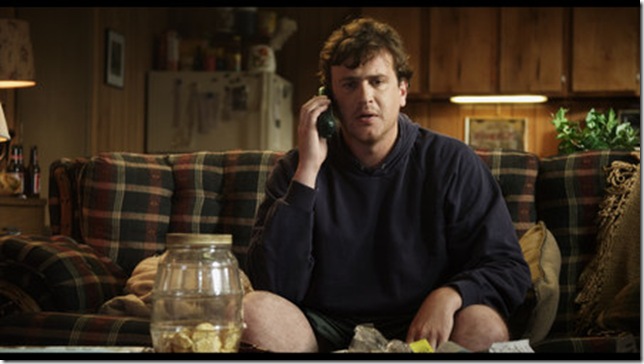Jason Segel has a face for radio. He possesses the kind of pocky countenance that, were he around in the ’40s, would have landed him roles as a bruising heavy in the film noir canon, and not much else.
These days, he gets to make out with Cameron Diaz in Bad Teacher, which doesn’t suggest that we’ve become less image-conscious in our society (ha!). Instead, his ascent to romantic object of affection is another Hollywood special effect, an enviable bit of wish fulfillment for those of us who don’t have the chiseled jaws of matinee idols.
You’ll have plenty of time to ponder this and more in Jeff, Who Lives at Home. After all, the visage of Jason Segel is on display a good portion of the running time. The lengthy opening shot is an extreme close-up of his face, an unflattering study of every stubbly, pimply pore and tousled strand of hair, as he shares, into a recorder, his theories about the signs in Signs. Next, we cut to a full-body shot of Segel, revealing that he has, in fact, been sitting on the john this entire time. Even when he’s relieving himself, he’s a fount of half-baked profundity.
It’s the kind of crude edit that might turn up in a Tom Shadyac, Kevin Smith or a lesser Farrelly Brothers movie, but it is certainly beneath Mark and Jay Duplass, the writing-directing brothers who instantly penetrated the American art-house vanguard with their 2005 debut The Puffy Chair. Then again, most of the ideas in Jeff, Who Lives at Home are beneath the Duplasses. As much as I love punctuation in movie titles, Jeff is too intellectually easy, too tidy, too twee — an efficient, vacant luggage terminal where their other movies spilled over with excess baggage.
Segel plays, at first glance, an archetypal Segel role, i.e., one that would have gone to Seth Rogen four years ago. His Jeff is a pot-smoking 30-year-old without a car, a girlfriend, or any discernible skills or social life who, as the title suggests, lives in his mother’s basement. But he’s also a mystical mental protégé of Yoda and Gandhi, believing that everything in the universe is connected, that everything happens for a reason, that Signs is a masterpiece.
We just need to be open to accepting life’s accidents, knowing that they are not accidents but opportunities. So when he receives an angry call by a man searching for someone named Kevin, Jeff looks for, and finds, plenty of signs related to the name Kevin, sending him on a contemplatively madcap daylong journey. Among other things, he continually bumps into his more successful but insufferably prickish brother Pat (Ed Helms), a clichéd misogynist ripe for the kind of redemptive spiritual awakening that only a free-thinking bro like Jeff could provide.
There’s also the story of their widowed mother Sharon (Susan Sarandon), a cubicle drone who begins to receive anonymous flirts from a coworker claiming to be her “secret admirer.” The supposedly unlikely sender of the valentines can be predicted a mile away, because that’s the kind of film this is. Whimsy is its naturalism, and when everything is a surprise, nothing is a surprise. Expecting the unexpected doesn’t really work when the unexpected is the norm.
This may be a problem inherent with the film’s concept. Interconnectedness, premonitions and cosmic linkage are easy crutches for deus ex machinas, for the kind of coincidences that would be unacceptable in a “regular” movie. But I don’t recall Miranda July’s Me and You and Everyone We Know, which took a similar theme as its connective thesis, being this precious; I remember it instead as one of the most illuminating films about the modern human condition.
Some of the Duplass brothers’ trademark methods are used to fine effect here. They are the best practitioners of jittery, handheld camerawork to emerge since Soderbergh; each jagged zoom in and out feels like an editorial comment on their characters’ troubles. And Segel brings an unjaded affability to every role he plays, charming both despite and because of his ungainly musculature (there are many gags in the film aimed at his oversized frame). Helms, too, is used to better dramatic potential than he has been prior to this.
But I couldn’t help thinking back of the scabrous verisimilitude of The Puffy Chair, the sense of a relationship dissolving slowly, painfully, uncomfortably and yes, sometimes even funnily. This conveyance of reality at its awkward margins also colored Baghead and Cyrus, their accomplished follow-ups.
The Duplasses, up to this point, seem to have concluded that life is messy, and that things don’t always work out. I miss these observations. Jeff, Who Lives at Home is a Duplass movie hijacked by Hollywood sentiment.
JEFF, WHO LIVES AT HOME. Directors: Mark and Jay Duplass; Cast: Jason Segel, Ed Helms, Susan Sarandon, Judy Greer, Rae Dawn Chong, Evan Ross; Distributor: Paramount Vantage; Rating: R; Opens: Friday at most theaters
